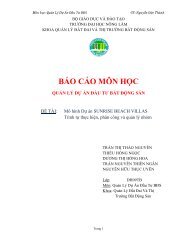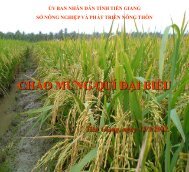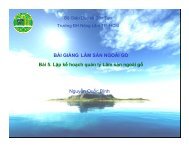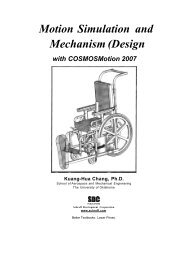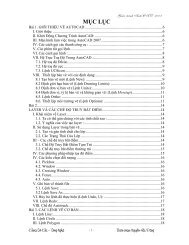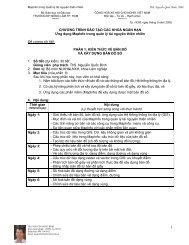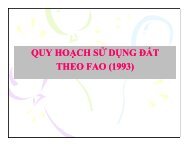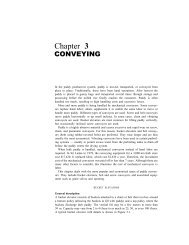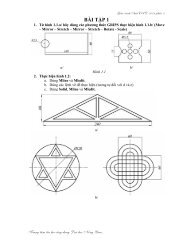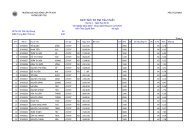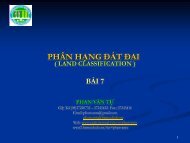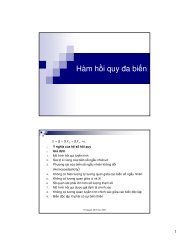The challenge of HIV/AIDS: Where does agroforestry fit in? - World ...
The challenge of HIV/AIDS: Where does agroforestry fit in? - World ...
The challenge of HIV/AIDS: Where does agroforestry fit in? - World ...
You also want an ePaper? Increase the reach of your titles
YUMPU automatically turns print PDFs into web optimized ePapers that Google loves.
132<strong>World</strong> Agr<strong>of</strong>orestry <strong>in</strong>to the Future<strong>The</strong> CSARD course is a 16-month programmeand the college has the capacityto take 80 students each year. Participantscome from Kenya, Sudan, Tanzania andUganda. <strong>The</strong> curriculum has been developedover the years to meet the needs <strong>of</strong>participants and their communities. <strong>The</strong>course aims to empower communities fromwith<strong>in</strong>, by encourag<strong>in</strong>g them to nom<strong>in</strong>ate<strong>in</strong>telligent women and men who havedemonstrated a commitment to communitydevelopment. A scholarship scheme, sponsoredby GORTA, allows students fromsome <strong>of</strong> the poorest regions to participate.Start<strong>in</strong>g <strong>in</strong> 2006 Baraka College will <strong>of</strong>fera diploma course <strong>in</strong> susta<strong>in</strong>able agricultureand rural development (DSARD). This willbe a full-time residential eighteen-monthprogramme <strong>of</strong>fered at Baraka. <strong>The</strong> courseis aimed at certificate <strong>in</strong> agriculture/ruraldevelopment graduates who a have a m<strong>in</strong>imum<strong>of</strong> two years experience work<strong>in</strong>g withrural communities.Participants know that there will be very fewopportunities for employment with NGOs,government or church organizations. However,Bakara realizes that graduates <strong>of</strong> thiscourse will have problems satisfy<strong>in</strong>g theiraspirations for a better quality <strong>of</strong> life <strong>in</strong>rural communities. Consequently, we havea support structure for past students, theBaraka Agricultural College Old StudentsAssociation (BACOSA), which gives practicalsupport and <strong>in</strong>cludes a sav<strong>in</strong>g and creditscheme. In addition, the College has designedspecial short courses <strong>in</strong> ‘start<strong>in</strong>g yourown bus<strong>in</strong>ess’ and ‘participatory projectplann<strong>in</strong>g’ for past students <strong>of</strong> the CSARDcourse. We believe this is a cost-effectiveand efficient way <strong>of</strong> improv<strong>in</strong>g the developmentcapacity <strong>of</strong> rural communities.On average, 500 farmers and developmentworkers complete one-week coursesat Baraka every year. <strong>The</strong> content <strong>of</strong> thesecourses ranges from organic farm<strong>in</strong>g to e-bus<strong>in</strong>ess. <strong>The</strong> emphasis <strong>in</strong> all short coursesis on the participant acquir<strong>in</strong>g practicalskills that she/he can apply on their farm or<strong>in</strong> their community or small-scale bus<strong>in</strong>ess.<strong>The</strong> beekeep<strong>in</strong>g development unit providestra<strong>in</strong><strong>in</strong>g and extension services <strong>in</strong> all aspects<strong>of</strong> beekeep<strong>in</strong>g, an enterprise that has goodpotential to create susta<strong>in</strong>able livelihoods,especially <strong>in</strong> arid and semi-arid areas.<strong>The</strong> area-based development programmeis concentrated <strong>in</strong> the Kamara and Laredivisions <strong>of</strong> Nakuru district. This programmeapplies the pr<strong>in</strong>ciples and methods<strong>of</strong> SARD used <strong>in</strong> all other Bakara programmes.It also demonstrates that theconcept works and provides a practicaltra<strong>in</strong><strong>in</strong>g ground for course participants.Day-release courses are aimed at teachers,school and college students and members<strong>of</strong> the general public. <strong>The</strong> objective is topromote the SARD concept among thegeneral public.Susta<strong>in</strong>ability <strong>of</strong> BarakaCollegeIncome generat<strong>in</strong>g units (IGUs) are animportant part <strong>of</strong> our strategy to develop asusta<strong>in</strong>able college. Baraka has four suchunits: the farm, workshop, highlands honeyand shop. Until 2002, these units were rundirectly under college management andwere an overall f<strong>in</strong>ancial liability to thecollege. In 2002, they were separated fromdirect college management and set up asan <strong>in</strong>dependent department. Efficiency hasimproved and the units are now contribut<strong>in</strong>gapproximately 5 percent <strong>of</strong> the collegebudget. <strong>The</strong> aim is to <strong>in</strong>crease this to 20percent by 2007. It is clear that management<strong>of</strong> IGUs demands a very differentmanagement style from that required forsocial service provision!However, no matter how successful localf<strong>in</strong>ance generation is, it is evident thatf<strong>in</strong>ance from external sources will have tobe provided if <strong>in</strong>stitutions such as Barakaare to fulfil their missions. In develop<strong>in</strong>gcountries, <strong>in</strong> the absence <strong>of</strong> direct Statef<strong>in</strong>ancial support, this fund<strong>in</strong>g will haveto come from external sources; hencethe need for loyal long-term externalpartners.Conclusion<strong>The</strong>re are several lessons learned fromBaraka’s experience that have broaderapplication <strong>in</strong> the challeng<strong>in</strong>g work <strong>of</strong>br<strong>in</strong>g<strong>in</strong>g smallholders and pastoralists <strong>in</strong>tothe heart <strong>of</strong> the development process. Froma global perspective, theorists and policymakers must respond to realities – and doso quickly. <strong>The</strong> symptoms are all there –<strong>in</strong>ternational terrorism, ecological disasters,uncerta<strong>in</strong>ty over energy supplies, disease,urban violence, unhapp<strong>in</strong>ess <strong>in</strong> the developedworld, especially among youth – andthe paradigm that is responsible for thesesymptoms needs to be <strong>challenge</strong>d andalternatives proposed.In Baraka’s view, SARD is a conceptthat has the potential to achieve thesusta<strong>in</strong>able development <strong>of</strong> the Africancont<strong>in</strong>ent. Susta<strong>in</strong>able agriculture, properlyunderstood and applied by Statepolicy, will promote economically efficient,environmentally friendly farm<strong>in</strong>g.Rural development requires strongnational and <strong>in</strong>ternational policies andsupport and, <strong>in</strong> rural communities, workis needed to create the preconditions fortake-<strong>of</strong>f. However, with current developments<strong>in</strong> <strong>in</strong>formation and communicationtechnology, there is no reason why



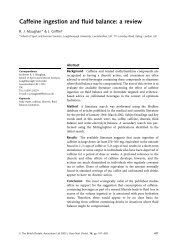
![MNC_00_Modau [Compatibility Mode].pdf](https://img.yumpu.com/51432208/1/190x146/mnc-00-modau-compatibility-modepdf.jpg?quality=85)
